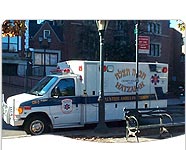 
What to Ask
By Alton Thygerson
Those caring for an injured or suddenly ill person should attempt to find out what may be causing the problem. You will have a difficult time obtaining these answers unless to ask questions. Whether it is a 7-year-old girl with a fever, a 27-year-old man with abdominal pain, or a 90-year-old man with chest pain, past medical history doesn't have to only be obtained by a doctor or a paramedic to perform. First aiders can and should obtain such information.
An often-used mnemonic, SAMPLE (Signs and Symptoms; Allergies; Medication; Past medical history; Last oral intake; Events leading up to the illness or injury), offers a way of gathering important medical history. Such information will be useful in providing first aid and will also be helpful for the paramedic and doctor.
Signs and Symptoms
Signs are based on visual cues. Look for visible signs of distress, such as bleeding, poor color, or anxiety. Symptoms are what the patient is complaining about. Ask questions-talk to the patient and any bystanders, family members, or friends. Find out as much as possible about the persons chief complaint.
Allergies
An estimated 1%-2% of the population has an allergy to food or medicine. While this number is low, a serious allergic reaction could lead to respiratory failure and death. To prevent a problem, you should ask a person if they are allergic to any medications or foods. Common medications that can cause allergies include penicillin, tetanus, "caine drugs" (lidocaine, novacaine), and sulfa drugs. Food allergies are also common. Frequent culprits include shellfish, chocolate, orange juice, and peanuts.
Medications
There is a multitude of medications and the number rises every day. Along with the countless number of drugs prescribed by a doctor, there are a countless number of over-the-counter medications. No person can be expected to remember all of these medications. Knowing which medications a person is taking can give a clue to his or her medical history.
Past Medical History
You should ask "Has this happened to you before?" and "Have you had any medical problems in the past?" It might be useful to ask the person about recent trips he or she has made to the doctor's office or hospital. The problem the person is having might be a repeat of a past medical problem.
Last Oral Intake
It is important to know when the person ate or drank, should he or she require surgery. An empty stomach is preferred when undergoing surgery. What the person ate or drank may also be the cause of the problem.
Events Leading to the Illness/Injury
You should find out what force caused the injury (eg, falling downstairs, ejected from a car), or for suddenly ill persons, ask what is wrong.
Conclusion
Finding out past pertinent medical history is important. Using the SAMPLE mnemonic can be an effective means of getting the information and serves as a reminder about what information to obtain. You can't provide first aid unless you have a sense of what led up to the emergency.
The above is for general informational purposes only. Always consult your
physician regarding specific medical issues and call Hatzalah or your local
ambulance service in the event of an emergency.
Back to Digest Index
|









